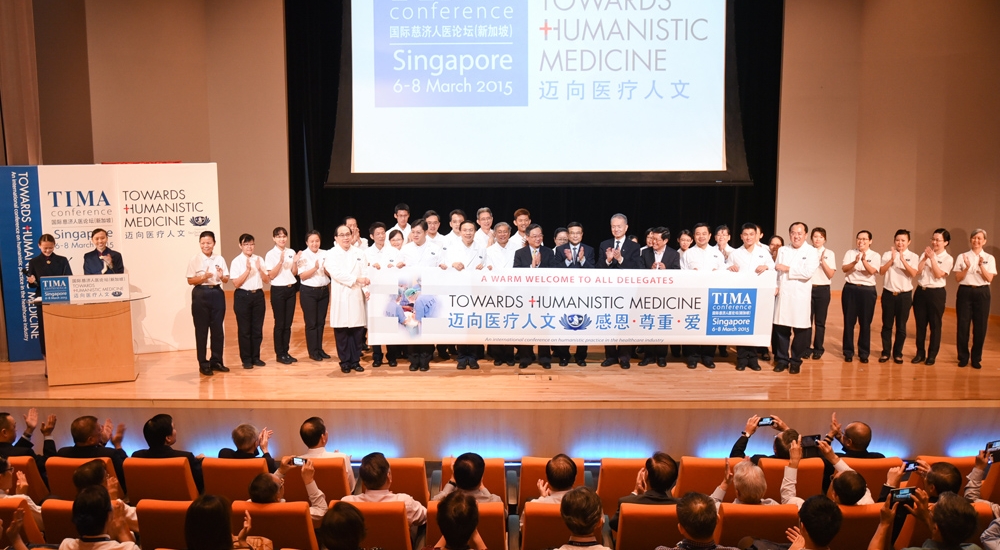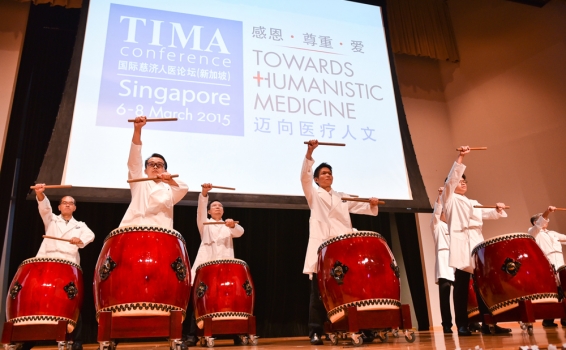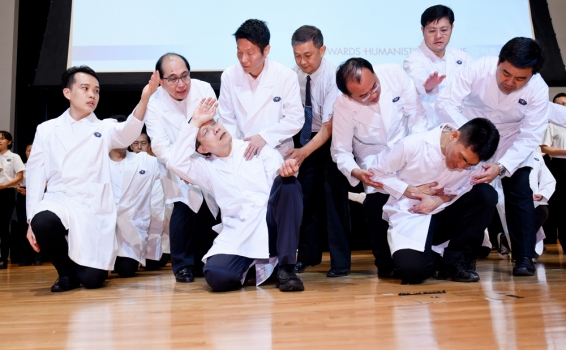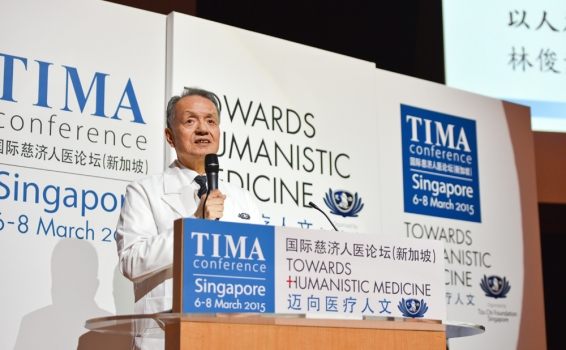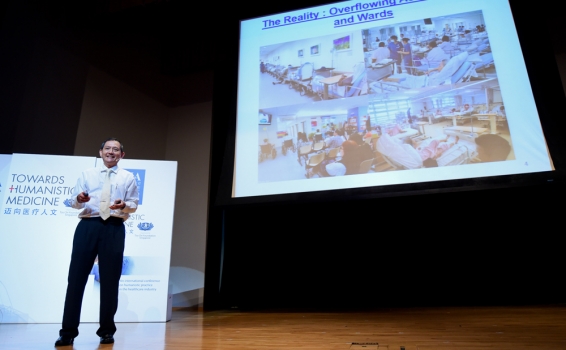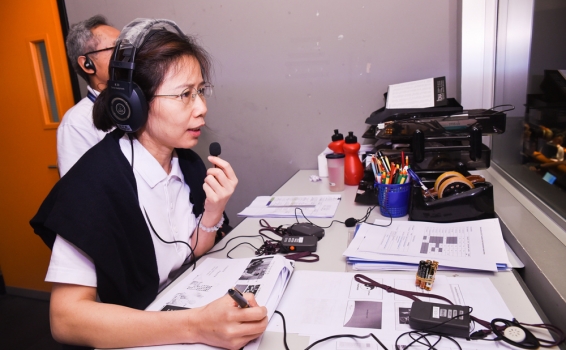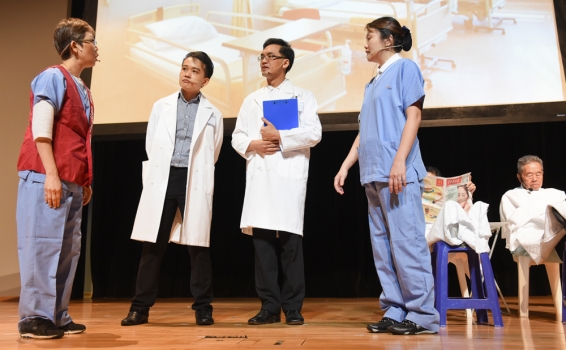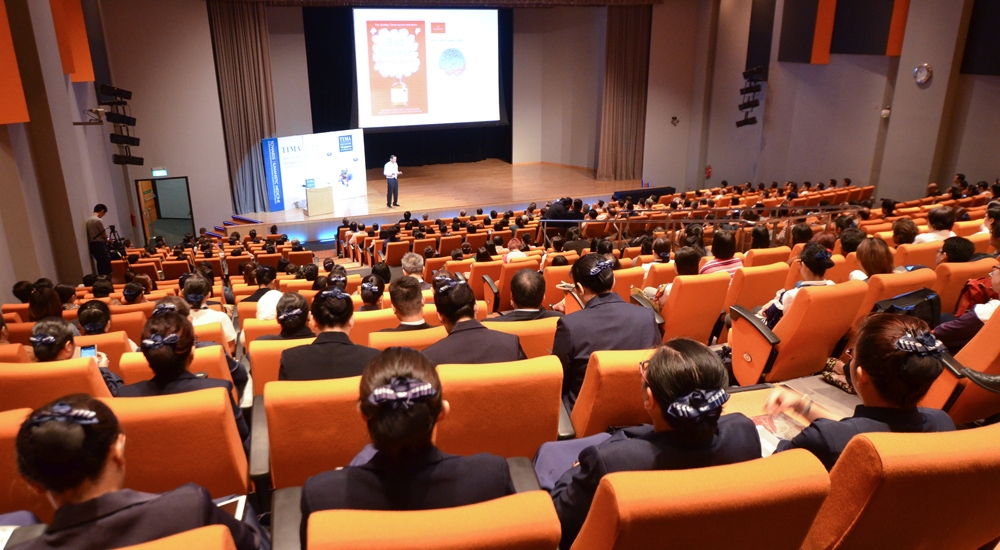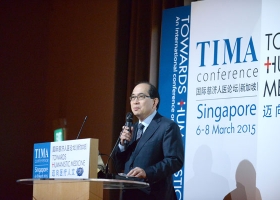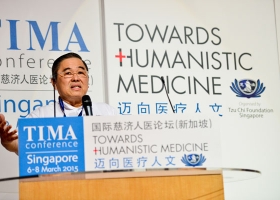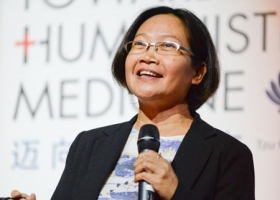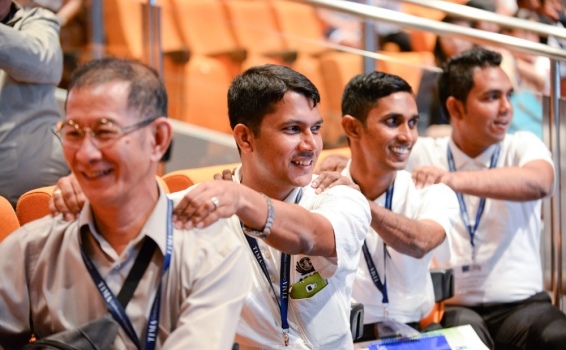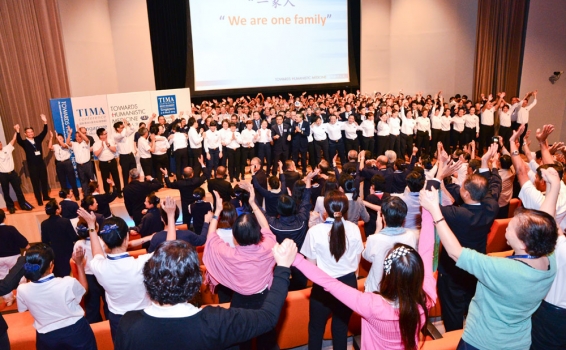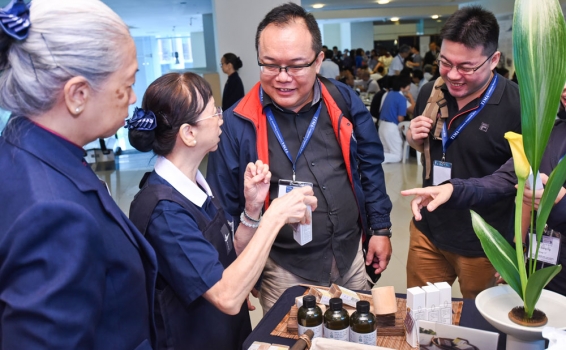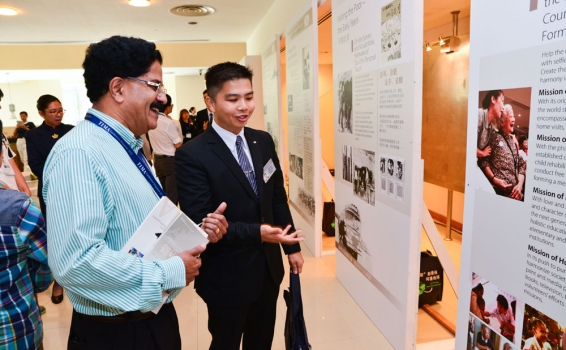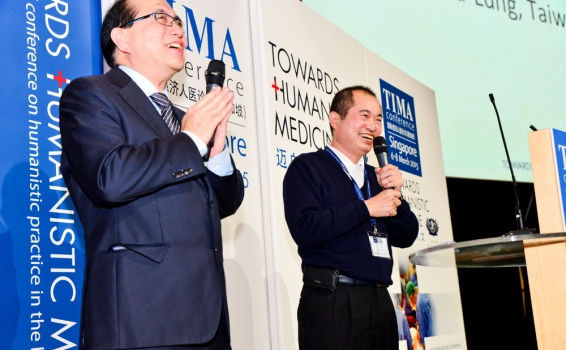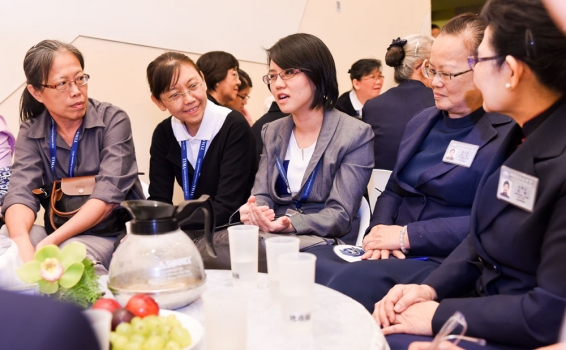By Lim Chwee Lian, Bernard Ng, Li Ming Hui, Tai Kai Pik, and the Tzu Chi Singapore Documentation Team
Translated by Shu Yin & Clara Fu
Photo by Wong Twee Hee
With its theme of “Towards Humanistic Medicine,” the long awaited conference organized by the Singapore chapter of the Tzu Chi International Medical Association (TIMA) officially commenced amidst warm applause and the blessings from many. This was the first TIMA conference held outside Taiwan and it had attracted 488 participants. The event was held from March 6 to 8, 2015 at the Matrix@Biopolis, Singapore’s international research hub for biomedical sciences. The opening ceremony was graced by Minister for Health Mr. Gan Kim Yong, Member of Parliament Mr. Yeo Guat Kwang, CEO of Tzu Chi’s Medical Mission Dr. Lin Chin-Lon, CEO of Tzu Chi Foundation (Singapore) Mr. Low Swee Seh, TIMA members and 378 healthcare professionals from 11 countries and regions.
In his opening speech, Minister for Health Mr. Gan Kim Yong noted that the clinical knowledge and experience of Singapore’s healthcare professionals are much-needed skills that can be tapped to help others beyond our own shores.
The year 2015 marks the 50th anniversary of Singapore’s independence, and is also significant for Singapore TIMA members as this is the first time their numbers have exceeded 100 since its establishment 16 years ago. Tzu Chi Singapore now has two free clinics in operation and has also begun providing quality medical home care services to the needy. In view of this, it specially compiled 50 heartwarming stories of humanistic medical care in TIMA’s bilingual commemorative book, “Humanistic Care Through Humane Hearts” and Minister Gan, Dr. Lin, and Tzu Chi’s chief supervisor of Global Affairs Stephen Huang, together with the other VIPS took the opportunity to recommend the book.
Using English as an International Language
In response to the rousing drumbeats that filled the air in welcome to conference participants hailing from Singapore, Malaysia, Indonesia, Philippines, Cambodia, Hong Kong, Taiwan, PRC, Sri Lanka, USA, and Germany, the entire auditorium resounded with warm applause. Clad in their white doctor’s garb, Singapore TIMA members presented their item with great sincerity, the result of applying themselves earnestly to drum practice sessions for close to a month outside of their busy preparations.
Rohaizan Rahmad, a nurse from the Tan Tock Seng Hospital marveled at how the moment she stepped into the conference venue, she could feel the humble sincerity of Tzu Chi volunteers. In addition, the venue decoration made one feel calm and at ease.
Since March 4, 2015, there had been a continuous arrival of over 80 overseas participants to the Lion City. More than 300 volunteers were deployed in the preparations, and they tirelessly travelled back and forth between Jing Si Hall, the airport, hotel and the conference venue, emulating the same spirit of attention to details which was typical of the Taiwan TIMA conferences.
“TIMA conferences were always hosted in Taiwan in the past. This is the first time that it has been held outside Taiwan and it is truly a golden opportunity,” said Dr. Lin Chin-Lon, CEO of Tzu Chi’s Medical Mission. He further expressed the hope that Tzu Chi could share the spirit of humanistic medical care with the world, a holistic concept which encompasses “the whole journey, the whole family and the whole team.”
TIMA currently has a network exceeding 30 countries, comprised a majority of Chinese-speaking members. “This time, the entire program was conducted in English. The US, Europe, Indonesia and the Philippines all speak their own languages, and English is the common language they can understand,” said Dr. Lin as he explained why the team had decided to conduct the conference in English.
The three-day conference boasted a program lineup that was of very practical value to participants. Apart from the sharing by the superintendents of the various Tzu Chi hospitals in Taiwan, the topics of bone marrow donation and “silent mentors (body donors)” were also covered in depth and participants were given a rundown of the international humanitarian aid efforts and medical missions that had been carried out in Indonesia, US, Sri Lanka and the Philippines etc. The dual themes on the third day’s agenda focused on humanistic education as well as how to actualize humanistic medical care, and it was divided according to the specialized branches of western medicine, Traditional Chinese Medicine (TCM), dentistry and nursing care. The conference also adopted a small group format so as to facilitate discussions and workshop participation.
Gratitude and Respect as Part of Humanistic Medical Care
Dr. Lin and Associate Professor Chang Shu-Chuan, Director of Nursing at the Hualien Tzu Chi Medical Centre, each gave a talk on Tzu Chi’s humanistic healthcare.
With the help of video footages, Dr. Lin brought his audience on a tour of the six Tzu Chi hospitals to experience their humanistic culture. Conference participants were impressed at how the healthcare workers started by cultivating gratitude for their colleagues, made aspirations to help others, and took part in various endeavors including medical home visits, house cleaning for beneficiaries, the Tzu Chi Year-end Blessing ceremonies, as well as other voluntary activities.
“Birth, sickness and ageing are the realities of life and nursing professionals are themselves participants in this natural cycle.” Director Chang explained that the provision of nursing care must develop according to the needs of patients and it is in the provision of medical care that one can clearly see the qualities of a bodhisattva manifest in the ever-present and timely response to the cries of the sick.
Apart from on-the-job training, training and briefing sessions, community service, role model exemplification etc., the Tzu Chi Medical Centre’s nursing team also work hard to nurture a working environment of mutual gratitude where “new nurses” progress to become “good nurses” and finally, “model nurses.” Director Chang gladly noted that their retention rate of new nurses is as high as 80%.
People First - Rethinking the Approach
Group CEO of Alexandra Health System Mr. Liak Teng Lit put it across bluntly in his talk, “Humanistic Medicine in Singapore’s Healthcare Landscape-Lofty or Lost?” that many doctors nowadays focus on the technical; they treat the illness and not the patient. For example, the different doctors will all prescribe separate medicines, such that the same patient will have to take more than 20 different types of medication at the same time. Through this approach of breaking down an illness into its various aspects and treating each ailment separately, it becomes hard for patients to benefit from a comprehensive treatment plan. Though it is possible to treat emergencies and save lives with such an approach, it is not conducive to the treatment of chronic illnesses.
According to the 2013 figures released by the Ministry of Health, Singapore has 25 large hospitals and specialist treatment centers. With 11,000 patient beds available, on average there are 2 doctors for every 1,000 people. Mr. Liak feels that the public hospitals face a patient crunch and while healthcare professionals may try their best, they face the danger of succumbing to burnout in the long run. Thus, promoting a humanistic medical culture here is a challenge.
Mr. Liak first got to know about Tzu Chi 11 years ago. After the South Asian Tsunami disaster, Mr. Liak, together with a medical team, was in Aceh, Indonesia taking part in a humanitarian aid mission and it was then that he saw how efficiently the Tzu Chi humanitarian team worked.
Passing on the Medical Baton
During the conference, images of the TransAsia air tragedy in Taiwan flashed across the screen - Tzu Chi medical volunteers showing concern for the rescue team, the hospital superintendent and doctors trapped in a muddy bog while making their way into the disaster zone, doctors braving the wind and rain to bring food to families of the air crash victims… all those images spoke volumes of the commiseration and compassion of volunteers. As Dr. Lin put it, charity and healthcare together go hand in hand.
Outside the auditorium, the posters, partitions and decoration were carefully put together to project the humanistic culture of Tzu Chi. There was also a display of products that was used in Tzu Chi’s international humanitarian aid missions, such as multi-purpose portable beds, hardy cloth shoes, solar-powered knapsacks, solar-powered caps, instant rice etc. These attracted a lot of attention from conference participants who marveled at the ingenuity of the products.
First time TIMA conference attendee and radiation therapist Xu Wen Shi from Terengganu, Malaysia, had accepted her senior’s invitation over an online chat platform to sign up. She commented how different the TIMA conference felt with its “artistic decorative feel” as compared to the other events she had attended in the past. She expressed how much she liked the sign language item presented by Singapore TIMA members at the opening, as the lyrics of the accompanying song made her remember why she had chosen a medical career in the first place.
In the song, “Ode to the White Coat” presented by Singapore TIMA members, the lyrics liken Tzu Chi’s Medical Mission to a world in which the sun never sets because of the presence of healthcare teams who bring forth Great Love from their hearts. In a similar vein, head of TIMA Singapore Dr. Fong Poh Him extended a warm invitation that would have resounded in the hearts of conference participants long after the curtains fall: “We welcome you to be part of TIMA!”
After the first day’s program “Kindle the Fire Within,” the second day’s contents aimed to urge healthcare professionals to “Be That Beacon of Light” in their profession.
The second day’s program was at a slower pace as participants attended the series of workshops and talks lined up. With great interest, they attentively listened to touching anecdotes that had arisen in the course of healthcare workers “treating patients, their illnesses, and their hearts”. While some busily took notes, others would frequently use their phone cameras to capture both notes and scenes of interest.
Treating Ailments and Hearts with Sincerity and Empathy
In his topic for the first and second day, Dr. Chien Sou-Hsin, Superintendent of the Taichung Tzu Chi Hospital in Taiwan shared how he leads his healthcare team in an experiential session of ploughing land and planting rice, so that they could better appreciate and empathize with what ailed their farmer patients, such as swollen or inflamed feet, caused by the hard work in the fields. This exercise served to change the attitude which they used to treat their patients.
Master Cheng Yen once said that if the sick cannot find their way in, healthcare professionals should seek them out. Superintendent of the Taipei Tzu Chi Hospital Dr. Chao You-Chen thus shared a story of one of his patients named Mr. Huang, who suffered from a degenerative spinal condition.
The disease caused his hip and knee joints to atrophy, leaving him with only the use of his hands and effectively confining his activity to the bed and chair. Over eight years, he was unable to venture out to seek medical treatment but Tzu Chi volunteers were undaunted; they donned a safety helmet on Mr. Huang and with mechanical help, hoisted him from his home on the third floor down to the first floor. After a series of treatments by medical teams from different departments, Mr. Huang was finally able to stand upright on his feet. From the video, conference participants were able to see his gratitude as he thanked the volunteers and hospital staff for giving hope to him once again.
“To have doctors from different specialized fields come together to discuss a patient’s case is truly rare!” said Ho Foong Nun, a nurse from the National Heart Centre who was touched by Mr. Huang’s story. She was impressed by the spirit of cooperation shown by the doctors across the differing medical specialties in the Tzu Chi Hospital.
Compassion From Within
“Tzu Chi and myself are looking for someone and that person could be you.” The superintendent of the Hualien Tzu Chi Medical Centre Dr. Kao Ruey-Ho shared a promotional clip of movie superstar Jackie Chan calling for bone marrow donors in his segment which traced the beginnings of the Tzu Chi Stem Cells Center.
More than 20 years ago, Tzu Chi sought to eradicate misgivings that the general public had towards bone marrow donation with the slogan that bone marrow transplant can save lives without causing lasting harm to the donor. Tzu Chi volunteers are always on hand to accompany donors through the initial blood test and health checks, up until the post-donation follow ups. To date, the Tzu Chi Stem Cells Center has the world’s largest Chinese bone marrow data bank, and has benefitted bone marrow recipients from 29 countries.
Priyantha who hails from Sri Lanka, and a TIMA doctor himself, commented cheerily that as the conference was conducted in English , he could understand the entire program. After his participation in the 2008 TIMA annual convention in Taiwan, he became the first TIMA member in Colombo. He feels it is a pity that Sri Lanka does not have a bone marrow donor registry, thus while wealthier patients who suffer from blood diseases usually seek treatment in India, the majority of such patients are resigned to their fate.
To attend the conference in Singapore, Priyantha had to take leave from work. He also made use of the time he had to look for audio-visual equipment which he plans to use back in Sri Lanka to promote healthy living habits among the locals. With the skewed ratio of doctors to patients back home, he commented that most of the Sri Lankan doctors who have their hands full treating patients still have some way to go in learning how to interact with them.
Green Health Care
Green Health Care was one topic which captured the interest of many during the conference. Merci V. Ferrer, the Asia Director of international organization Health Care Without Harm (HCWH), Dr. Lin Chin-Lon, CEO of Tzu Chi Medical Mission, and Mr. Chen Fan Lun from Taiwan’s Industrial Technology Research Institute spoke unreservedly about the philosophy and implementation of green health care.
Ms. Ferrer traced the beginnings of the “green health care” concept back to 1996; at that time, American studies showed that pollution from mercury, dioxin and other poisonous chemicals were invariably produced during the provision of healthcare services. Lives are saved, but at the expense of the earth, thus hospitals must not only provide patient care but maintain healthy environments as well. In practice though, this is fraught with many difficulties.
Dr. Lin shared that in his hospital, they took a six-pronged approach in the areas of conviction from management, employee buy-in , environmental protection, community development, patient-care and strengthening the belief in the green health care philosophy. These include encouraging employees to use the staircase instead of the lifts, promoting the use of bicycles, being self-sufficient in the hospital’s food requirements, growing organic vegetables, serving vegetarian food in the premises etc.
Citing the Confucian analect that “He who practices virtue is sure to have like-minded companions,” Ms. Ferrer pointed out that there are many partnering hospitals around the world like the Sambhavna Clinic in India, which have implemented green building concepts and reduced the impact that man has on the environment. In a similar vein, a hospital in the Philippines has also implemented many environmentally-friendly initiatives, such as replacing the use of mercury in its processes, reconfiguring waste products for other use, using compost to fertilize crops etc. just to name a few.
Shen Xin Yue, a nutritionist from the Tan Tock Seng Hospital commented that she was most impressed by how Tzu Chi members would practice what they preach. In the past, she had attended meetings on the topic of nutrition where invariably, participants would advocate a balanced nutritional intake during their discussions. Yet, lavish banquets would follow after the meetings ended. Upon seeing that all the vegetarian meals provided at the TIMA conference were nutritionally balanced and tasty, she was impressed.
How does one manage the twin demands of medical professionalism and humanistic care, and how can the culture of humanistic healthcare be sustained? This was the question raised by an Indonesian student during the Q&A session.
“It can be achieved with just a smile and some kindness. Actually, humanistic culture is part of medical care. They are two sides of the same coin and cannot be viewed in isolation,” was Dr. Lin’s answer. Dr. Lin himself had a story to share; when making his rounds of the wards, he would rather go back again two hours later than to shake awake a sleeping patient. His story illustrates how a medical worker too can have a bodhisattva’s compassion; the spirit of humanism is thus the key to cultivating and maintaining relationships between us and our fellow human beings.
Conference attendee Xie Su Lian, a TCM doctor from the Public Free Clinic Society in Singapore, used to think that Tzu Chi was just an ordinary VWO (Voluntary Welfare Organization). After having attended the conference, she found that it was quite different from other medical conferences and was especially touched by how Tzu Chi doctors and nurses not only care for patients’ health but also their emotional well-being.
Another attendee, Tang Ming Shi, a doctor from Tan Tock Seng Hospital, was impressed with Tzu Chi’s efforts in organizing the conference and commented that he never expected he would be able to learn so much in a day. Dr. Tang admired the respect shown to the “silent mentors” (body donors) at Tzu Chi University’s medical school and expressed his wish to attend the TIMA Annual Convention in Taiwan in September 2015.
Yao Zhao Kang, a Hongkonger who has been working in Khoo Teck Puat hospital as a social worker for over half a year, shared that he felt he had gradually lost empathy for patients, and that he kept asking himself how he could maintain a compassionate heart. “I’d never expected that Tzu Chi is such an enormous organization. It’s hard to find another NGO like Tzu Chi in Hong Kong. It’s really great that Tzu Chi University’s medical students get to learn about the life stories of their silent mentors; this helps to inspire compassion in them. I should show more respect to patients,” said Yao.
Bringing About a Cycle of Great Love
Dr. Nandakumar, an experienced doctor from the National Kidney Foundation (NKF), is no stranger to Tzu Chi. Many NKF patients had received subsidies from Tzu Chi for their dialysis treatments before their application for NKF subsidy was approved. He was especially touched by how medical staff at Taipei Tzu Chi Hospital were able to help diabetic patients by carefully tending their festering wounds and thus saving their legs from amputation. “Besides patience, it is also important to treat patients and their families with mindfulness and empathy,” said Nandakumar.
During the closing ceremony on Day Two, some 200 volunteers and TIMA members went on stage, and both volunteers and participants expressed thanks and appreciation to each other. Then those on stage led the audience in singing the song, “We Are One Family”, with sign language, filling the auditorium with warmth and good cheer; this brought the second day’s program to a close. On the third and last day, the participants would be separated into different groups, including Western medicine, TCM, nursing, and dentistry, where they would get to delve deeper into their respective areas of specialization. (Credit to Tzu Chi Singapore)

